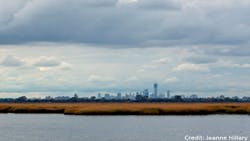Professors Receive Funding to Study Water Quality in New York
For most people, Superstorm Sandy was a wake-up call that something needs to be done to adapt urban coasts to the threat of coastal flooding, which is only expected to worsen due to sea level rise and climate change. A recent MarketWatch report said the value of homes vulnerable to coastal flooding in New York City metropolitan area alone was estimated to be $250 billion. However, making sure protective measures are done the right way is of dire importance, not only in mitigating storm surge, but also in ensuring water quality is not harmed in the process.
Three Stevens Institute of Technology professors in Hoboken, N.J., are working to ensure just that, as they are receiving $700,000 in funding to study the impact coastal manmade adaptations will have on the water quality in Jamaica Bay, N.Y. Professors Philip Orton, Alan Blumberg and Georgas Nickitas see this as a real need.
“There’s already a lot of pollution in Jamaica Bay’s watershed,” said Orton. “Before these modifications are made to prevent flooding we need to know whether or not they’ll weaken Jamaica Bay’s natural flushing with nearby open ocean waters.”
Adaptations to coastal flooding include projects such as storm surge barriers or the creation of wetlands or islands to reduce flooding and block waves.
"Municipalities across the region are moving quickly to shore up their coastal defenses,” said Blumberg. “We are excited to be able to help quantify the efficacy of these defenses, as well as their effects on water quality, with our computer modeling.”
The professors, along with partner James Fitzpatrick of HDR (formerly HydroQual), will conduct the two-year study using a computer model that simulates the physics and chemistry of the bay's waters, within which they can manipulate the landscape to add barriers, wetlands and other protective features.
The project is among nine others supported by The Science and Resilience Institute at Jamaica Bay (SRI), a research consortium led by The City University of New York (CUNY), which was recently awarded $3.6 million from the Department of the Interior’s Hurricane Sandy Mitigation Funding.
Source: Stevens Institute of Technology


